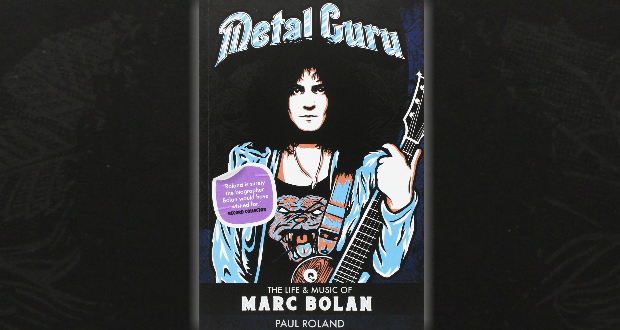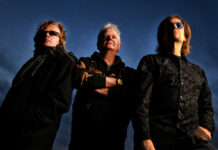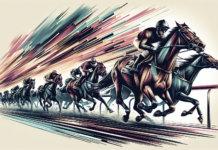Author Paul Roland has written three previous books on Marc Bolan, each taking a different point of view, presumably offering new insights as added research and interviews lead to further information. The previous one, Cosmic Dancer, he felt in hindsight too critical so to remedy that he has produced Metal Guru. Not that it is merely an extensive fan letter, all the information we need to help paint our own personal picture of Bolan is here, if we but look. Furthermore, not all we learn about Bolan is good, though perhaps as amateur psychologists we can begin to see why, but still so much about the man remains an enigma. At turns fascinating and perplexing, for those not alive when T. Rex ruled the charts and the telly it will be hard to appreciate how all encompassing Bolan’s presence was for but a brief short while, this 240 page tome may however give them some insight.
Born Marc Feld on 30th September 1947 the second son to Jewish and Catholic parents, he was of a precocious nature and doted on by his mother. Being the centre of attention was something that started early in his life, moving out of his original Jewish neighbourhood and to a new school he became of changes early and sought ever new ways to stay on top, while a possible introverted shyness and what would be now be diagnosed as dyslexia meant he could never truly be part of the crowd. Being a mod, at least in so far as fashion went, took him a step in the direction he wanted, having access to a guitar became the way to holding down a career.
Much of Bolan’s early life proves interesting, a vivid background of a post-war England emerging towards the hedonistic sixties. Much in the past has been made of the name-changing Bolan’s joining John’s Children – legendary proto-punk/garage pop art band. It seems whipping an electric guitar he could barely play was his main creative involvement along with a few rudimentary songs kicked into shape. Interviews with singer Andy Ellison (later front man for punk band Radio Stars) are particularly revealing; Bolan was not as worldly wise as he pretended, large audiences were new to him, drink and the drugs of the day something he abstained from. The truth, Bolan was a constant liar, revising his life story to suit whoever or whatever whim. Fanciful and intriguing to some, oddly not completely off-putting to others but it did become a bore or something to ridicule once stardom begin to wane for him. But before it did, he had to get there, and before the game was up regarding his playing ability, he moved on from John’s Children to form what would become Tyrannosaurus Rex, and this proves to be the most illuminating part of the story for music history buffs like me.
Tyrannosaurus Rex was primarily an acoustic duo, Bolan on acoustic and vocals, Steve Peregrine Took on percussion. Or that’s what I used to think. The tales proves far more involved however; Peregrine Took played flutes, toy pianos and supplied backing vocals too, that may not seem all that impressive but it made the musical ensemble work; Roland goes to some length in explaining this. While Bolan was front man and wrote the music – Tolkien style song ripe for the times – you also get the impression that Peregrine Took’s fully immersing himself in the hippy culture and underground scene helped establish their credentials as much as disc jockey John Peel’s championing of the band. That he would go off with people on the scene and get wasted on drugs did not help his cause however, Bolan abandoned him in Seattle on completion of an indifferent US tour, and would eventually leave this mortal coil in 1980, an all but forgotten man. Apparently a biography on him is due later this year, and Roland has raised my interest to want to search that out.
By now, Bolan was shacked-up with June Child, who he would later meet. Here’s another person previously cast in the shadows regarding Bolan’s story. She was perhaps his Angie Bowie and the catalyst that helped push him to the top of the pops. Not in his visual identity, that we will find, with a dab of glitter on his cheek proves to be another lady; one who also eventually leads him onto the drugs scene. No, Child had not only worked for Pink Floyd she had been girlfriend and muse to Syd Barrett, she knew the music scene and its people, and she proved the anchor and support system that could succour Bolan’s insecure ego, bolstering and armouring him for eventual system. That Bolan’s family acted badly towards her when the marriage failed, due to his philandering, is outlined though not dragged through the mire, though possibly shows the way society still treated marriage back in the 70s.
Comparisons to David Bowie are always made when discussing Marc Bolan. They were friends from their early mod days, both changed their names before finding fame, both had Tony Visconti produce them, and they were glam rock’s gods, but Bolan achieved the adulation first. That Bowie would eclipse him, demoting Bolan to the role of John the Baptist as Bowie’s Ziggy Stardust took on the role of rock and roll messiah must have hurt deep, no matter that the friendship lasted time and distance until the end.
Odd really, since Bolan was not averse to abandoning those he no longer had a use for, be they Child, Peregrine Took, or John Peel who had advocated and supported him for so long. Others include former managers, with some delving into the rumours of Bolan’s possible homosexuality explored – Though my own take on this is, being the chancer he was, he might have played up to older men of that provocation if he thought they could do his career some good, and was probably mostly asexual aside from the odd dalliance (more of which later).
Bolan discovered a hit formula: that there are those who will declare his hit singles are littered with old Eddie Cochran and Chuck Berry riffs, and amped-up blues licks miss the point: that he put these together in such a way that made them sound fresh, and topped them with lyrics where black jive talk mingled with the enfant terrible style of science fiction writers who’d made their name with Britain’s New Worlds magazine, as edited by Michael Moorcock… and made it all palatable for pre-pubescent and teenagers alike.
Bolan did this under the abbreviated T. Rex name, but it was larger, bolder and far more becoming of the great dinosaur that had once strode the earth. And again like Bowie he brought in a gang of likely lads to help him; Mickey Finn played bongos, Bill Legend drums and Steve Currie on bass. Also, just like The Spiders From Mars, the musicians in T. Rex only got a few takes to record all those hit singles and albums they would make in a brief few years. Put that into context: a 3 minute single, even if recorded say six times only 18 minutes, throw in another 12 for breaks in between, that’s half-hour of their lives and for each subsequent decades since it’s possible that thousands have been singing along everyday to those songs. A shame that just like The Spiders they were on a wage, however it appears they also got paid when they weren’t recording or touring so they probably got the better deal out of both groups.
Walk into a newsagents during T.Rex’s heyday and Bolan’s face would be pouting out to greet you from the cover of Smash Hits, Melody Maker or maybe even one of the red top newspapers. Switch on the telly and there were enough hits being pumped out to fill countless Top of the Pops and Supersonic appearances. ‘From Ride A White Sun’ to ‘20th Century Boy’ the formula rarely failed, with albums like Slider the lyrical surrealism was given free reign. And, to yet again name check Bowie, “Boy could he play guitar”.
Roland gives us the impression that Bolan probably didn’t like hard work, so how he had progressed from a simple chord strummer to someone who could pull out such roaring good sounds from his six string? Visconti was probably responsible for the overdriven volume sounding right, but Roland goes into deep explanation of some of the progressions, techniques and styles Bolan applied as he evolved as a musician and while chance plays its part, the aural package remains rather unique. There’s an offhand comment from Bolan that Eric Clapton had offered some tips. It sounds unlikely, and if so influence and results are totally different. That stated, June Child was friends with Alice Ormsby-Core, Clapton’s significant other (and drug buddy) of the times. Either way, a friend who saw T. Rex live in their heyday steadfastly rated Bolan’s guitar playing, and he had seen many of the greats.
But wasn’t it just pop music they played? No, far from it. For many, T.Rex and glam rock were the first stepping stone onto bands like Led Zeppelin, authors like William S. Burroughs and feeling that the decade held new promises, hopes and aspirations for us kids. We could learn to be disappointed as we grew up, but for that moment in time Bolan taught us we no longer had to be reserved Brits with stiff upper lips we could be outrageous, possibly earn lots of dosh and live the dream.
In hindsight, as one reads this book you acknowledge the façade the entertainment business plays out for us rarely changes, and it’s only really today where vacuous no-talents can become successful. Could Marc Bolan have been a game player in today’s musical cattle market? If he were a youth today, he’d be too far out there to be acceptable, had he lived to a ripe old age he might have brightened us for five minutes regaling old war stories on the Graham Norton Show or God-forbid hamming it up on The X-Factor.
So many biographies cut short when it comes to the leaner years of a star’s success, but Roland is to be admired for not doing so. True, we may find the finer details of each album through to the final Dandy in The Underworld a little much at times, but the important things that helped lead to Bolan’s decline are not shied away from, as expressed in interviews with former band members, friends and family. After so long of trying and having found a winning formula Bolan wouldn’t change his musical template, the drink and drugs he had shied away from became the crutch to shield him from failing record sales. Then, when he did begin to change his music the world wasn’t interested.
The fall began with Born To Boogie, the film about Bolan made by his then friend Ringo Starr. Meanwhile, John Lennon would pull Bolan up in the press, basically saying yes he thought T.Rex good but Marc wasn’t good enough to be in the great pantheon with The Beatles.
Roland is incredibly diplomatic on the matter of Gloria Jones, the former Motown singer who would go onto have an affair with Bolan, become his wife and give birth to their son, Rolan. That it was a love match there can be no doubt. Possibly it’s my reading of this book and getting to know the first Mrs Marc Bolan that sours what had been until now my own take on the situation, but more so as discussions about his later music are discussed, her influences in that area, passive or otherwise, weren’t for the best.
As any good story should, there is the momentary sense that after the fall the hero will rise again. He was offered a teatime TV show Marc, intended for kids we teenagers enjoyed it, being reminded how good he had been, then he went on tour with The Damned as support and older kids began talking about him being an influence on punk rock. But like the ball being taken away from newspaper strip character Charlie Brown one final time, tragedy struck.
Does anyone reading this not know that Bolan and Jones were driving home, the car went awry and hit a tree, killing Bolan. The full details are given, the events leading up to the night and after. They make grim reading. So, the man died. We never really know him, and I suspect only the women closest to him in his life ever really did, but this book helps break some of the mysteries.
Marc Bolan was two years too old to join the infamous 27 Club, a posthumous title given for the likes of Hendrix, Morrison et al. Frankly, I like to think that Bolan is up there on a fluffy white cloud angry that he was cheated of the glory of becoming one of that pantheon but at the same time incredibly chuffed that he became a legend. It’s just a shame his fans couldn’t share more moments with the Dionysian creature he was on this mortal plane.
Metal Guru – The Life And Music Of Marc Bolan will be available in paperback from Extradition Publishing from 4th September. More than worth a read, check it out.





















